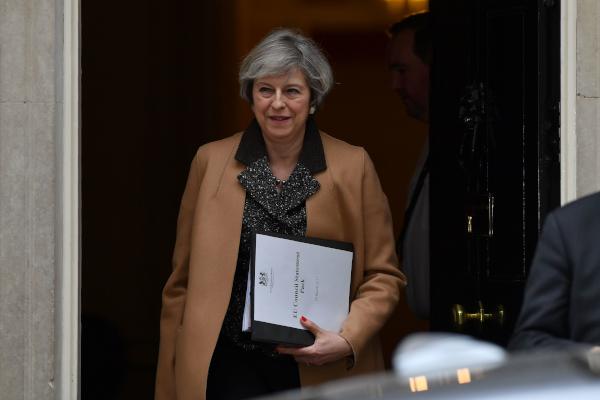Prime Minister Theresa May announced on Monday that Britain will formally trigger its exit from the European Union on March 29.
“The UK’s permanent representative to the EU informed the office of (European Union President) Donald Tusk that it’s the UK’s intention to trigger Article 50 on March 29,” her spokesman told reporters.
Triggering Article 50 of the EU’s Lisbon Treaty, the formal procedure for leaving the bloc, will open a two-year timetable for difficult negotiations, meaning Britain could be out of the EU by 2019.
The spokesman said May would notify Tusk in writing and then give a speech to the British parliament.
“We want negotiations to start promptly,” he said.
Britain voted in a June referendum by a 52 percent majority to leave the EU — the first member state ever to do so.
Monday’s announcement comes just days before the European Union celebrates the 60th anniversary of the Treaty of Rome which created the bloc.
“Last June, the people of the UK made the historic decision to leave the EU. Next Wednesday, the Government will deliver on that decision and formally start the process by triggering Article 50,” Brexit minister David Davis said in a statement.
“We are on the threshold of the most important negotiation for this country for a generation,” Davis said.
“The Government is clear in its aims: a deal that works for every nation and region of the UK and indeed for all of Europe – a new, positive partnership between the UK and our friends and allies in the European Union.”
May has said she wants to leave the European single market in order to be able to control immigration.
The European Commission, whose chief negotiator Michel Barnier will spearhead the talks with London on behalf of the other 27 member states, said it was ready for the Brexit process.
“Everything is ready on this side,” Margaritis Schinas, the spokesman for European Commission chief Jean-Claude Juncker, told a briefing.
“We are ready to begin negotiations,” he said.
The European Commission is expected to provide an initial answer to Britain’s Article 50 notification within 48 hours but negotiations are not expected to start for several weeks or even months.
EU leaders will hold a summit to approve Brexit negotiating guidelines “four to six weeks” after Britain triggers its divorce from the bloc, a European source said Monday.
Britain’s planned notification on March 29 “does not leave sufficient time” for a meeting that had initially been scheduled for April 6, the source told AFP.
The British government has insisted the Brexit process is irreversible once Article 50 is triggered, although experts have said there is no legal ban on member states changing their minds before they have actually left the European Union.
Against the backdrop of trying to keep the UK together, May has a long wish list for the EU – the closest possible trading ties, security cooperation, regaining control over immigration and restoring sovereignty in various policy areas.
The EU has baulked at her demands, saying they amount to “having your cake and eating it”. May’s government acknowledges its opening position is bold, and is also preparing for the possibility of crashing out of the bloc with no deal.
While the government has signalled areas for compromise and is keen to remind EU leaders of the benefits of cooperation, government departments are still awaiting the final word from May’s office on which economic sectors to prioritize.
Britain’s commitment to payments into the EU budget – which officials in the bloc estimate to reach around 60 billion euros – are shaping up to be one of the first, and possibly most contentious, parts of the divorce talks.
Of the United Kingdom’s four nations, Scotland and Northern Ireland voted to stay in the EU in the June 23 vote while England and Wales voted to leave.
May on Monday began a tour of Wales, Scotland and Northern Ireland aimed at boosting support for Brexit.
